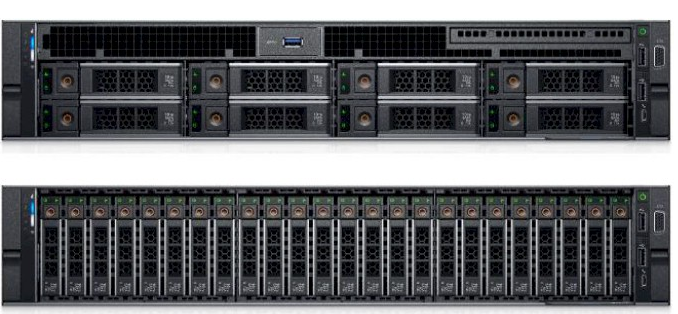Dell EMC has launched the PowerEdge R840 and R940xa, two new four-socket servers that offer GPU and FPGA coprocessors for accelerating machine learning, analytics, and other data-intensive workloads.

The PowerEdge R940xa is the more powerful of the two, supporting up to four Intel Xeon Scalable processors and as many as four GPUs or eight Intel FPGAs in a 4U box. The R840 is also a four-socket machine, but offers less in the accelerator department, supporting either two GPUs or two FPGAs. It takes up 2U of rack space.
In both cases, the four sockets appear to be primarily designed to offer more memory capacity rather than extra computational performance. Using all 48 DIMM slots, each server can be outfitted with up to 6 TB of DDR4 memory. Twelve of the slots can be used for non-volatile DIMMs (NVDIMMs), providing up to 192 GB of persistent memory. For fast, low latency storage, the servers can also be equipped with direct-attached NVME drives – up to 24 of them on the R840.
The R840 appears to be primarily targeted to analytics work, which is reflected in the lesser support for accelerators and the greater support for local NVME storage. For machine learning work, the more obvious choice is the accelerator-heavy R940ax, although the company is also positioning this platform for database acceleration.
Dell is also offering an Intel FPGA option on its PowerEdge R740, a high-performance dual-socket Xeon server that was introduced last summer. Up until now, Dell EMC only offered NVIDIA GPUs as an accelerator option on this platform. The addition of FPGA support appears to be targeting HPC customers who are considering using them to speed up their deep learning and simulation workloads. The system is bundled with software to make it easier to develop and run accelerated code on the FPGAs.
Two early adopters of the new servers are CERN and Brytlyt. CERN is employing the PowerEdge R840 to speed multiple scientific analytics workloads, while Brytlyt has demonstrated sub-second response times with its GPU-accelerated database software, processing billions of rows of data on a PowerEdge R940xa system. In both cases, the systems were equipped with GPU accelerators.
The support of Intel FPGAs would appear to be more of a long-term proposition, given the limited deployment of these devices in enterprise and HPC datacenters at present. But the inclusion of this support is part of a broader strategy by Dell EMC to expand its machine learning/AI horizons by deepening its partnership with Intel.
As part of this, the company will join Intel’s AI Builder program, a group devoted to developing machine learning/AI software on Intel silicon. That effort is exemplified by a collaboration between the two companies that has enabled customers to benchmark their deep learning and HPC codes on Intel’s Xeon processors and FPGAs.
Article from: https://www.top500.org/news/dell-emc-offers-fpga-and-gpu-options-on-new-servers/
